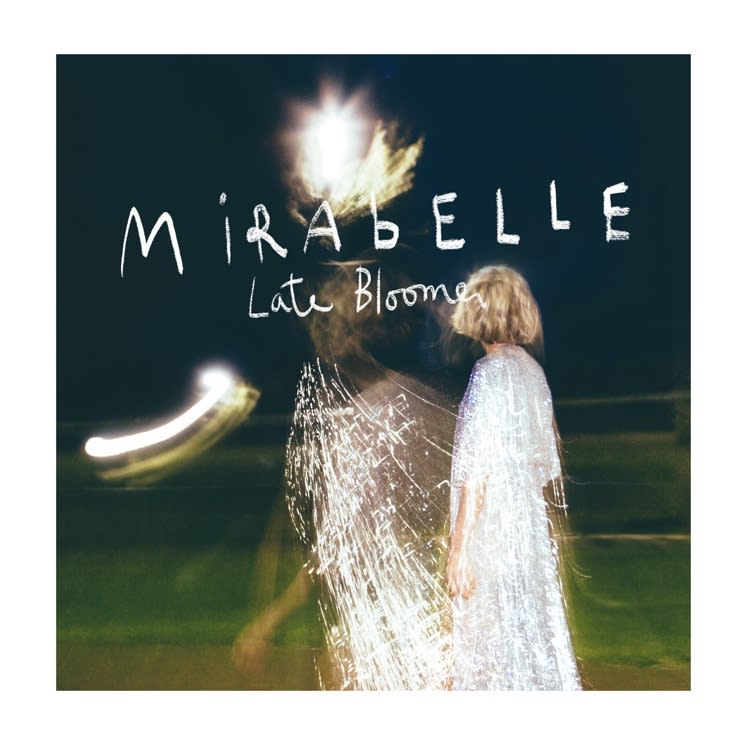Laurence Hélie vanished almost as quickly as she appeared. The Montreal singer-songwriter released her debut album in 2010 and won the Félix Award for best country album, but sometime after her second album, she entered a "musical depression" that lasted for years. Now, she's been reborn as Mirabelle, fuelled by anger and angst and raging artistry. Far removed from the folk-country Quebecana that had earned Hélie those early accolades, her reinvention has taken her into a new realm of dreamy, gothic alt-pop.
"I was young / Some time ago / Now I don't know / I was wrong to abandon the ship / To let it sink / I was wrong / Now I know," Hélie declares in "One in a Million." It's a sparse song that captures Hélie's artistic struggle as a feeling of eerie solitude, her voice sounding as if it's piercing a hole in the night sky. Eventually, she reveals a lush forest of bright, sparkling sounds and kicks off a process of discovery: Where are we, and where is Mirabelle taking us? Is the forest enchanted, or is it haunted? And is she leading us out of it, or deeper into it?
Those answers remain ambiguous. Late Bloomer is both spacious and claustrophobic. It will soothe you with the ambience of "Rose White" and "Cheated" and then unsettle you with the wandering analog synths and ominous guitars of "Daddy Long Legs" and "Teenage Dreams." Contrasting effervescent melodies with thunderous tones, "Betty" is demonstrative of the record as a whole: a wave of hushed, uneasy alt-pop with a quietly intense rockiness to it that lurks just under the surface like a vicious rip current.
You can hear the influence of the Cranberries and Mazzy Star, and Hélie has a voice and style that carries echoes of Sarah McLachlan's Surfacing. But the sound is very of this time. This record sits among a modern wave of art-pop exemplified by Weyes Blood's assuredly majestic Titanic Rising, Sharon Van Etten's darkly luxurious Remind Me Tomorrow, or Angel Olsen's monumental All Mirrors, albeit on an appreciably smaller scale than the widescreen maximalism and thematic ambition of those era-defining records. You might also listen to "Wall" and hear remnants of the brooding yet radiant sounds of Lana Del Rey.
In a way, Mirabelle's is a similar creative arc to that of Dan Mangan, the fellow Canadian whose work has evolved from the folk troubadourism of Nice, Nice, Very Nice, to the soft, boxed-in sound of More or Less. The record also has something in common with Florence and the Machine's High as Hope, an album that divided some fans and critics but held a ton of raw artistry in its dark, wounded sound.
And that is the idea behind Late Bloomer. Hélie sings of loneliness and self-sabotage. She sings of wasted dreams and the naïveté of youth. This is the scene of a tortured artist wandering through the woods of her own mind. It can be dark and it can be dreary. It's at times haunting and at other times enchanting. But Mirabelle does not intend on leading us anywhere — we're just here to wander through the fog with her.
(Simone)"I was young / Some time ago / Now I don't know / I was wrong to abandon the ship / To let it sink / I was wrong / Now I know," Hélie declares in "One in a Million." It's a sparse song that captures Hélie's artistic struggle as a feeling of eerie solitude, her voice sounding as if it's piercing a hole in the night sky. Eventually, she reveals a lush forest of bright, sparkling sounds and kicks off a process of discovery: Where are we, and where is Mirabelle taking us? Is the forest enchanted, or is it haunted? And is she leading us out of it, or deeper into it?
Those answers remain ambiguous. Late Bloomer is both spacious and claustrophobic. It will soothe you with the ambience of "Rose White" and "Cheated" and then unsettle you with the wandering analog synths and ominous guitars of "Daddy Long Legs" and "Teenage Dreams." Contrasting effervescent melodies with thunderous tones, "Betty" is demonstrative of the record as a whole: a wave of hushed, uneasy alt-pop with a quietly intense rockiness to it that lurks just under the surface like a vicious rip current.
You can hear the influence of the Cranberries and Mazzy Star, and Hélie has a voice and style that carries echoes of Sarah McLachlan's Surfacing. But the sound is very of this time. This record sits among a modern wave of art-pop exemplified by Weyes Blood's assuredly majestic Titanic Rising, Sharon Van Etten's darkly luxurious Remind Me Tomorrow, or Angel Olsen's monumental All Mirrors, albeit on an appreciably smaller scale than the widescreen maximalism and thematic ambition of those era-defining records. You might also listen to "Wall" and hear remnants of the brooding yet radiant sounds of Lana Del Rey.
In a way, Mirabelle's is a similar creative arc to that of Dan Mangan, the fellow Canadian whose work has evolved from the folk troubadourism of Nice, Nice, Very Nice, to the soft, boxed-in sound of More or Less. The record also has something in common with Florence and the Machine's High as Hope, an album that divided some fans and critics but held a ton of raw artistry in its dark, wounded sound.
And that is the idea behind Late Bloomer. Hélie sings of loneliness and self-sabotage. She sings of wasted dreams and the naïveté of youth. This is the scene of a tortured artist wandering through the woods of her own mind. It can be dark and it can be dreary. It's at times haunting and at other times enchanting. But Mirabelle does not intend on leading us anywhere — we're just here to wander through the fog with her.
